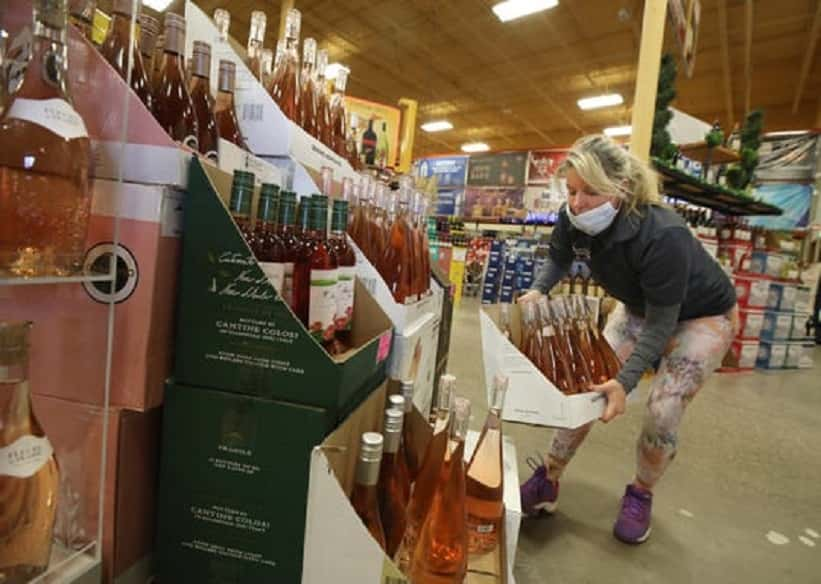
For a long time, local liquor stores could count on a pattern of sales: steady year-round activity with spikes during the holidays in November and December and again around Easter and Passover.
Because of the coronavirus pandemic, “that is out the window” — at least for now — said Erin Brooks, owner of Whitehouse Liquor and Wine at 650 Hylan Drive, Henrietta.
Gov. Andrew Cuomo’s New York State on Pause executive order prohibits bars and restaurants from serving customers on-site, but liquor stores are included in the edict’s “essential businesses” category. So drinkers are imbibing at home, and they’re buying alcohol in sometimes large, sometimes unpredictable quantities and novel ways.
“I’ve never seen anything like this,” said Joe Pecoraro, who has been a liquor-store owner for 42 years and since 1991 has operated Irondequoit Liquor at 525 Titus Ave.
Since stay-at-home orders went into effect in March, sales on some days have been more than double what they were in 2019, “and other days have seen less than that,” Pecoraro said. However, overall, he estimated that store purchases are up as much as 65% over last year, and on the day he spoke to the Democrat and Chronicle, he received a single order for $400 worth of alcohol.
“This is really a unique time,” he said. “You can pretty much throw out all the old records.”
Marketview Liquor at 1100 Jefferson Road, Henrietta, has seen a similar boost.
Owner Mike Palmeri described sales as being up “substantially,” but wouldn’t talk percentages.
“The last six to eight weeks have been phenomenal,” said Palmeri, who has owned liquor stores in the Rochester area since 1972 and like Pecoraro could not recall another time or situation that has produced such dramatic change.
Brooks said the pandemic has had more of a roller-coaster effect at Whitehouse Liquor.
When the crisis first hit, “it was like Christmas,” said Brooks, whose family launched Whitehouse in 1982. Then activity declined. It picked up again when people started receiving their federal stimulus checks, then decreased once more.
But “We’re just lucky to be open,” she said, “and we’re very grateful for that.”
As for what people are buying, Brooks has observed what she believes may be pandemic-related thriftiness.
“We’re selling a lot of boxed wine, a lot of commodity items,” she said. “A lot of people are unemployed or don’t know how their employment picture is going to change.” So they may buy larger quantities of products that are “just a notch down” from what they’d normally get, she said.
“But then there’s an uptick in demand for the pricier stuff, and that theory goes out the window,” she said with a laugh.
Pecoraro said there isn’t one particular type of alcohol that has risen above others in popularity in the COVID-19 era, although he noted that bottles of tequila, bourbon and Prosecco are moving well.
Palmeri said wine constitutes about 60 percent of his store’s sales and that, in general, wine-drinkers are more flexible and less brand-loyal than people who favor spirits. He couldn’t say whether that has translated into people buying larger quantities of less-expensive wines. But like Brooks, he said customers continue to purchase higher-end spirits, including tequila, bourbon and single-malt scotches.
Unlike in the past, many if not most of those sales are done outside the store.
“There’s a lot more online orders” placed via the Drizly app, Palmeri said. “There’s a lot more curbside pickup orders.”
Brooks said most of her customers are taking advantage of curbside pickup service, too, or having orders delivered via Postmates.
“Traffic through the store has not been as great,” she said.
Pecoraro said foot traffic at his location, which does not offer curbside service, remains fairly steady, even though “people are trying to limit the amount of time they spend out of their home.”
However, because of the pandemic, Irondequoit Liquor customers now can opt to have orders delivered using a combination of the Drizly app and DoorDash. And “It’s gotten much greater acceptance than I thought,” he said.
Meanwhile, several local establishments haven’t given up on offering mixed drinks. They’ve just had to find alternative, socially distant ways to do so.
Good Luck, 50 Anderson Ave., Cure at the Rochester Public Market and Lucky’s, 628 N. Winton Road, began selling some of their signature cocktails in bottles (containing six to 10 servings) almost immediately after the governor’s Pause order went into effect because it does allow bars, restaurants, distilleries and wineries to sell alcoholic beverages for takeout or delivery.
“When the government lifts an archaic restriction, that gets your attention right away,” said Chuck Cerankosky, co-owner of all three businesses.
Bottling cocktails in a way that preserves their freshly made qualities is no small feat, requiring not only bartending skill but a lot of specialized equipment, including a centrifuge and carbonation system.
“It’s not brain surgery,” Cerankosky said, “but it is pretty tricky.”
However, “I’ve been blown away by the response,” he said.
The three businesses sell up to 60 bottles a week, on average, he said. That represents “a small fraction of what we’d do in revenue if we were open,” he said. “But the human side is that it’s so nice to have that connection with people.”
To that end, they’ve also started selling cocktail kits paired with cocktail-mixing instruction, featuring Cerankosky behind the bar, via Zoom.
If nothing else, said the longtime restaurateur, “It’s a nice way to feel normal again.”


